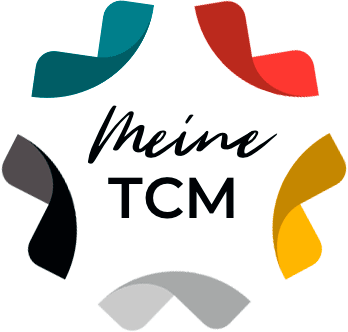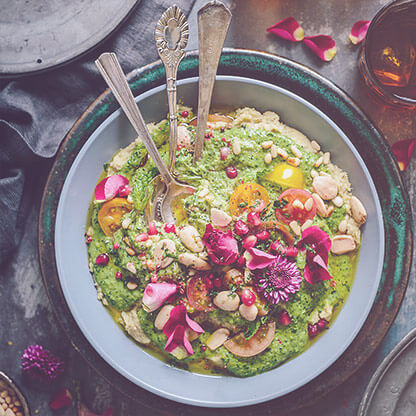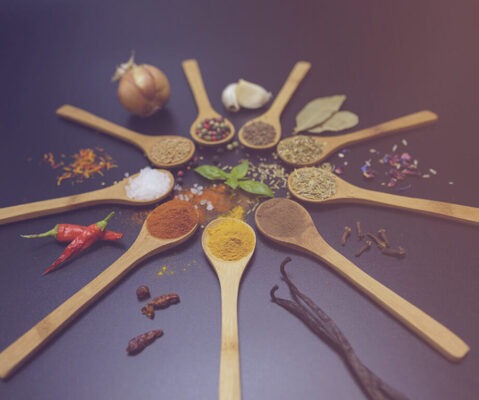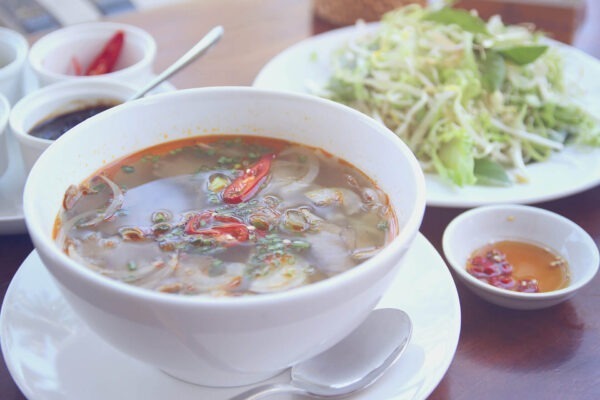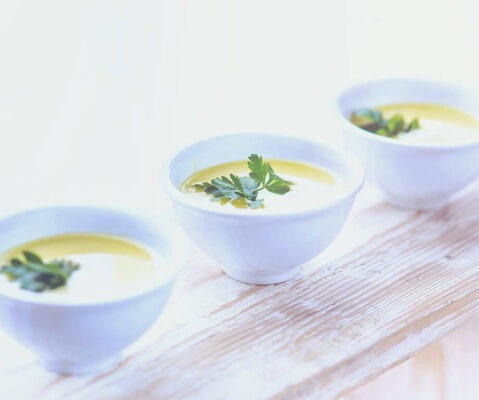Qi Gong Exercise
In 8 weeks to more energy, vitality & zest for life
Chew thoroughly
Week 1
"Drink your food and chew your liquids". Try to stick to this principle in the future, because it has proven very effective in practice. The first stage of our digestion already happens in the mouth. The amylase found in saliva is responsible for breaking down parts of the food before they reach the stomach. If the food pulp then reaches the stomach, the latter has less work to do with digestion and saves energy. Basically, the less time there is to eat, or the later you eat, the more the meal should resemble a lukewarm soup. This is because the stomach, due to its higher body temperature, demands warm food rather than cold food from the refrigerator.
When you eat slowly, the food pulp also enters the digestive tract in measured doses and slowly, from where it in turn slowly enters the blood. The ingested carbohydrates cause the blood sugar level to rise slowly and, as a result, the insulin level as well. There is no feeling of ravenous hunger. Only when carbohydrates are ingested too quickly, causing insulin levels to skyrocket and then drop again after a hill climb, does a feeling of ravenous hunger arise. It's best to chew each bite about 20 times. It sounds exhausting, but by focusing on conscious chewing, you'll find more enjoyment in your food. And that's the challenge for week 2!
Food is pleasure
Week 2
Enjoy your food and enjoy it with all your heart! If you want to make one of the suggested changes in your eating behavior, then choose the option or variant that gives you the greatest pleasure, so that you stick with it. Be creative and find your individual way of eating. For example, if you don't like the morning hot breakfast, in a sweet variety, try a savory breakfast, or change the type of cereal. Don't give up right away. Try to learn and celebrate conscious eating. Remember, "you are what you eat." There is an incredible amount of truth in this saying. In my practice I observe again and again that people who enjoy their food, whether alone or in nice company, many complaints simply solve themselves. That's why I recommend that you really enjoy your meal in a quiet and relaxed atmosphere, perhaps even by candlelight. We spend so much time in life eating. So why don't we enjoy it and gain energy and vitality from it?
Breakfasts Warm
Week 3
This is the challenge for week 3. You know that if something goes wrong in the morning and you don't feel good, your whole day is negatively affected. That's why I advise you to eat a hot breakfast in the morning. This is because the cooking process itself is a kind of pre-digestion and therefore your digestive system has less to do. It doesn't matter if you have a sweet cereal porridge with fruit or something spicy with millet, rice or vegetables. Your spleen energy is happy either way. It appreciates everything warm, because it can gain more energy from it.
Please, do not skip breakfast. If you don't eat breakfast, your spleen has to get its energy from the reserve, the kidney. At some point, however, the kidney is also exhausted because it lacks this energy. That's why eating a warm breakfast is like a healing from the inside, from the center out. Suddenly the body gets energy again. And above all, there is no so-called dampness, as the term of the commonly known "slagging" of the body, is called in TCM. By a typical classical breakfast with rolls from white flour, jam, cheese, curd cheese and possibly milk this internal humidity develops, which loads and slags the organism. Everything in the body then no longer functions smoothly. Above all, the metabolism is burdened by this. In many cases this leads to overweight. In my practice, I have been able to observe weight loss in some people, which occurred almost incidentally, just by switching to a warm breakfast. Responsible for this is the spleen energy, which among other things regulates our body weight. Please try it out. But at least for the duration of this challenge, because depending on how slagged the organism is, it takes some time until the excess moisture is gone from the body.
Water is the source of life
Week 4
The fact that you should drink enough water is really nothing new and certainly known to you. To calculate how much water you should drink, I always find the following formula helpful:
35ml of water per kilogram of body weight. That is, a woman who weighs 60 kg should drink 2.1 liters of water a day. And please, only water. Not tea. There are also teas that, like coffee, extract water from the body. Hot water should also be drunk every now and then. Start with at least 1/4 liter of hot water, preferably right after getting up. For practical reasons, it can be boiled in a kettle, but it is better to boil the water slowly in a pot, for 20 minutes. This is especially important in the cold season. In this way you supply your digestive system with energy in the form of heat. At the same time you rinse your kidneys and free your body from everything that has accumulated there during the night.
Cook your food
Week 5
This point triggers many discussions. I don't want to be too strict by insisting that only cooked food should be eaten. But the fact is that eating large quantities of raw food causes many people digestive problems or, more generally, triggers a state of lack of energy. That is, the body has too little yang, that is, too little internal heat. This lack of Yang is most easily recognized by the fact that those people are always too cold, not only in times of low temperature, but also in summer. I naturally recommend that they eat a warm vegetable soup instead of a salad.
Cooked vegetables are easier to digest than raw vegetables, plus they warm the body. Does that sound crazy? Try it out and let me convince you. Don't believe anything until you check it out for yourself. Speaking of kidneys, they are also happy about a warm meal because they need less energy for digestion and are thus spared. After all, the kidney is the storehouse of our vitality.
By now you have changed from a cold to a warm breakfast. Now, in the cold season, instead of salads and other cold foods, you should eat warming soups, such as vegetable or meat soups. You can also eat some meat and cooked legumes. Always remember, the cooking process is a kind of digestion. Warm foods are incredibly good for your health and overall well-being.
Away with the sugar
Week 6
No sugar and no refined carbohydrates! Eat as little sugar as possible. Sugar is hard on your pancreas because it constantly stimulates insulin production and, over time, weakens this important organ, which eventually becomes exhausted. From the TCM point of view, the spleen and pancreas form a team that is responsible for the so-called "postnatal energy". This, apart from breathing, largely determines the amount of energy available to you.
This area is also called the center of the human being. This center is responsible for your vitality and health. In this area, you can literally eat yourself sick or healthy. Therefore, avoid refined carbohydrates such as white flour and opt instead for so-called polyvalent carbohydrates. These include, above all, grains such as oats, spelt, barley, millet and wild rice. Fruits and vegetables also contain valuable carbohydrates. I recommend you to cook, steam or bake these foods, but these processes should not take too long.
Also avoid sweet juices and sodas. They hide calorie bombs that only harm the body. Drink pure water instead.
Vegetable protein
Week 7
Protein is the basic building block of life. We humans, but also animals and plants, consist of protein. Vegetable protein should be given a higher priority in our diet. I advise you to eat more and regularly vegetable protein. Particularly good sources of protein, in vegetable form, are legumes such as lentils, beans, soybeans and peanuts, but also mushrooms such as shiitake and oyster mushrooms and nuts. You should eat less animal protein, but eating a little meat now and then is quite good for your body, because it provides valuable Yang.
Animal protein that comes from factory farming is rarely of good quality. Many of our civilization diseases can be traced back to a too high consumption of bad animal protein. It can cause vascular diseases, diabetes mellitus, cancer, but also autoimmune diseases. High quality meat is a luxury item and, as already mentioned, does not need to be consumed daily, on the contrary, that would be bad. Eating meat 1-2 times a week is quite sufficient.
No fast food
Week 8
This is the last challenge in your journey through the food world. Congratulations if you are not a consumer of fast food! However, if you keep reaching for convenience foods or even consume them regularly, be aware that these foods do not give you energy but, on the contrary, rob your body of valuable energy. The many additives that are labeled with E-numbers, the body does not recognize and no one can say exactly what these substances cause in your body. Serious scientists assume that many of these additives make us sick in the long run and not more vital and healthier. Therefore, I strongly advise you to reduce your consumption of fast food. Also be critical when choosing the restaurant you go to eat.
